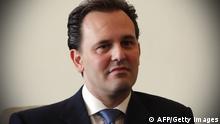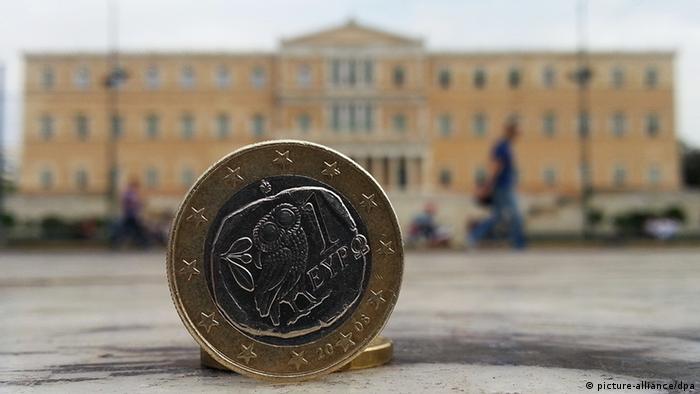Fresh financial aid is nothing but a brief respite for Greece, says former Greek Foreign Minister Dimitrios Droutsas. In an interview with DW, the member of European Parliament urged debt relief for Greece.
DW: Just a few days ago, international lenders agreed on providing Greece with almost 44 billion euros ($57.2 billion). Germany's Bundestag has also backed the new aid. How relieved are you?
Dimitris Droutsas: I am very relieved. Greece urgently needs this credit tranche to avert bankruptcy and continue to pay wages, pensions and so on. It's given the country a brief respite, but I would like to stress that once more, these decisions are merely patchwork and not a really convincing final solution that Greece and the euro need.
What would a convincing final answer look like?
 There's no way around debt reduction, Droutsas said
There's no way around debt reduction, Droutsas said
I know this does not go down well, in particular in view of the German domestic political discussion, but the truth is that Greek debt is particularly high. To give this foreign debt stability, there is no way around debt relief. I know there is a very controversial debate in Germany on the matter, but we must look the truth in the eye. Again, I believe debt relief for Greece in the near future is the only possible option.
Over the past months, the Greeks have initiated several reforms; they have shown they want to move forward. Some German experts, however, say that is still not enough. Hans-Werner Sinn, head of the Munich-based Ifo Institute, said the lenders have been increasingly making it easier for Greece to meet the requirements by lowering them. What is your opinion on such criticism?
I am one of those people who have always openly criticized the grievances in my country. I am aware of the fact there is much in Greece we must tackle. I always say Greece needs significant structural reform so the austerity measures, these bitter austerity measures, can take effect. The key words are "structural reform" and that takes time. The credit tranche gives Greece some more time. I hope very much - and that is an appeal and a warning to my compatriots - that the time we've won will really be used to implement the necessary structural reforms.
You have already mentioned debt relief. In Germany, people fear taxpayers will have to dig deep into their pockets to save Greece; many people fear aid for Greece is a bottomless pit. Can you alleviate that concern?
I am aware of the fact that it is very difficult to convince Germans that investing in Greece is a worthwhile enterprise. Unfortunately, reports and news in the past have been too unfavorable. But I do believe that Greece has great potential if we carry out the corresponding structural reforms. Greece has potential in the fields of tourism and renewable energy. Greece is blessed with sun, water and wind. That is an area that has not yet been explored. We must get our act together, carry out structural reforms and then we can take a more optimistic look at the future.
In principle, you have outlined the future Greek business model to become more competitive - is that right?
Exactly! Competitiveness is a big challenge for the country. We must simply get out of this five-year recession. That is the reason why things continued to get worse. Again, we can get a grip on it with the necessary structural reforms. The future might be brighter after all.
Germany's reputation has suffered quite a bit in Greece, to put it mildly. Do you think bilateral relations will improve now that the Bundestag has approved the ail package?
German-Greek relations are much better than you think. There has always been a very open exchange between our two countries and Germany has always supported Greece. That is something I would like to thank the German people for at this point. However, it is true that in particular tabloids and populists on both sides have exploited the situation. Resentment was fostered, including the image of the lazy Greek and the industrious German. Naturally, that has contributed to disagreement. We should putt hat aside and become aware of our own responsibility.
Dimitrios Droutsas, 56, is a member of the European Parliament and the Greek PASOK socialist party. He held the post of Greek Foreign Minister from September 2010 to June 2011.
Interview: Ralf Bosen / db dw de


No comments:
Post a Comment